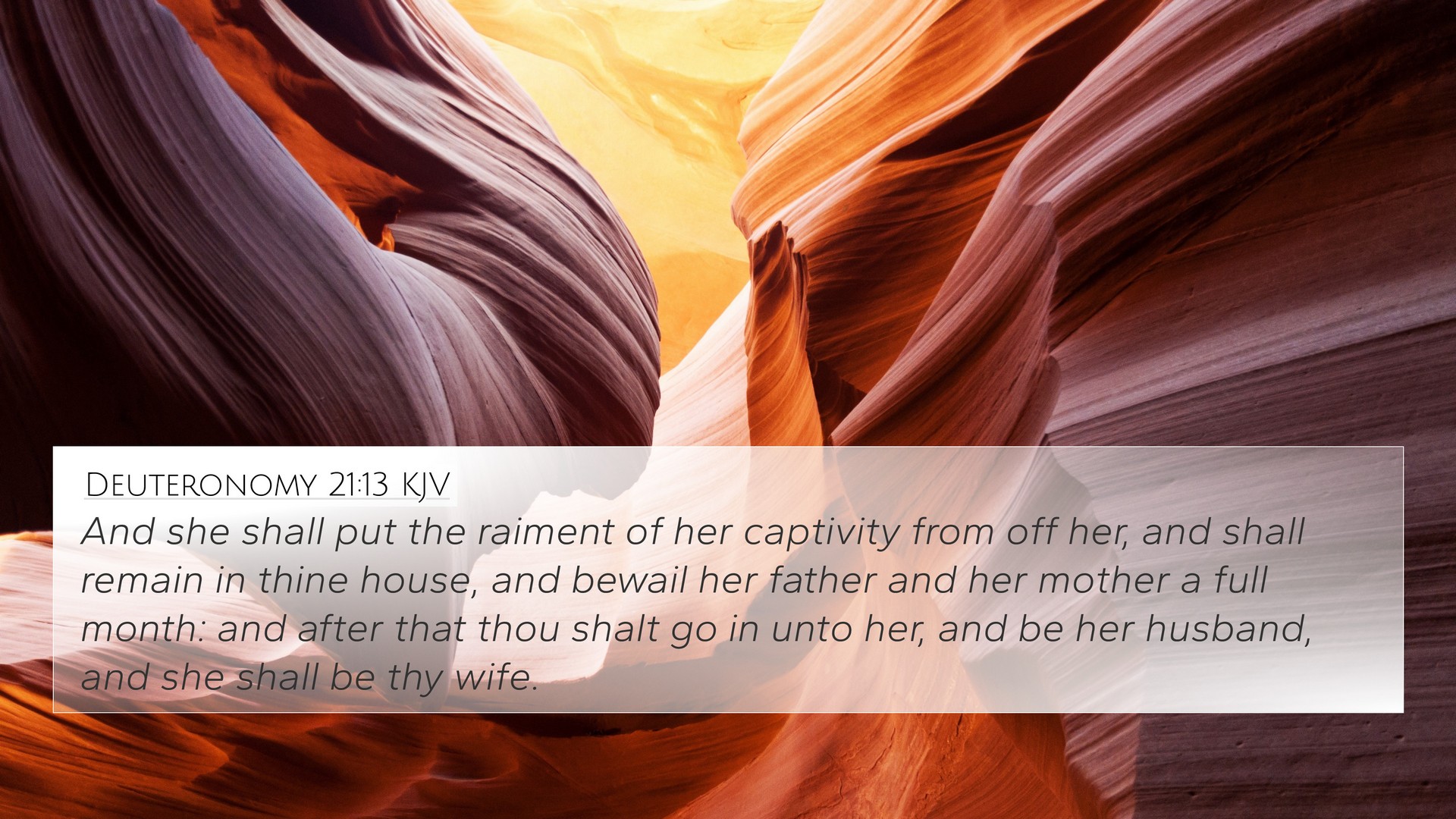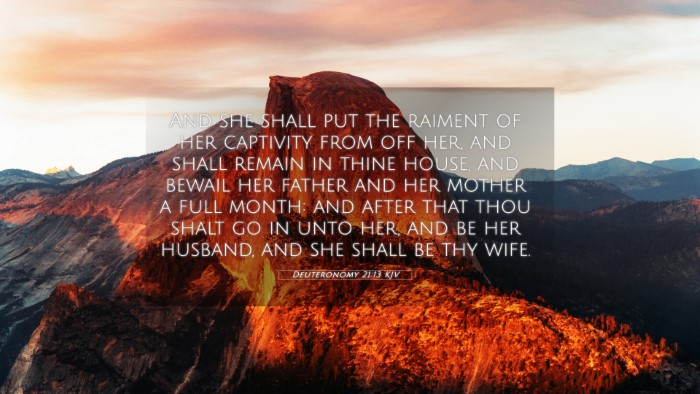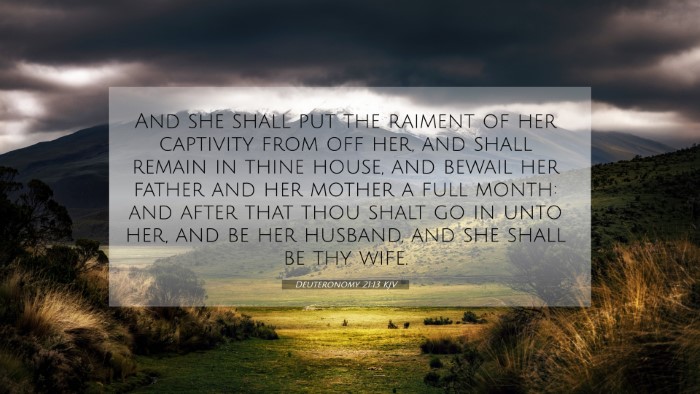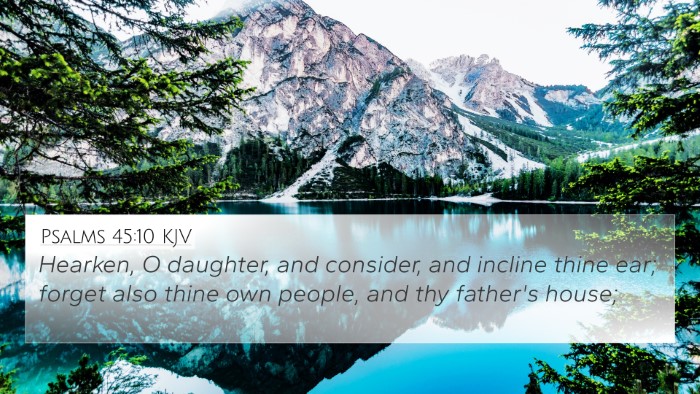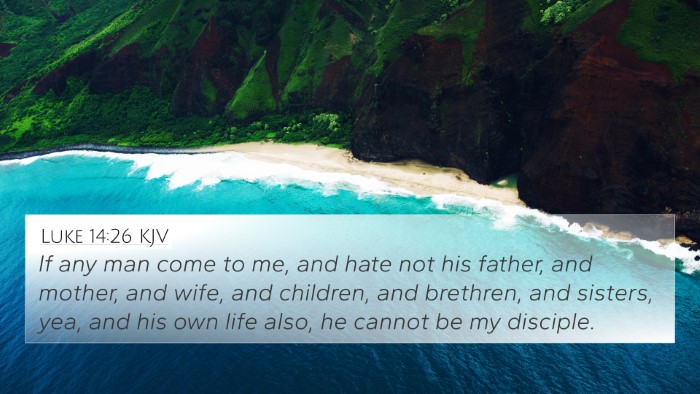Understanding Deuteronomy 21:13
The verse Deuteronomy 21:13 reads: "And she shall put the raiment of her captivity from off her, and shall remain in thine house, and bewail her father and her mother a full month: and after that thou shalt go in unto her, and be her husband, and she shall be thy wife." This verse addresses the treatment and integration of a captive woman into Israelite society, highlighting principles of compassion, respect, and legal statutes within the community.
Verse Context
In Deuteronomy, the Israelites receive laws concerning various situations they would encounter upon entering the Promised Land. This specific verse relates to the rules governing the treatment of women taken captive in war, emphasizing both their dignity and their rights.
Commentary Insights
-
Matthew Henry:
Henry notes that this passage reflects God's concern for the vulnerable, specifically the captive woman. The law provides a pathway for her integration into Israelite society while ensuring her mourning period allows for emotional healing. This also signifies the sanctity of marriage, which is not to be taken lightly.
-
Albert Barnes:
Barnes emphasizes the legal framework established by this verse, which serves to protect the rights and honor of the captive woman. By requiring a month of mourning, it reinforces the idea that marriage should not be rushed but entered into with respect and care.
-
Adam Clarke:
Clarke draws attention to the cultural implications of this law, explaining that it seeks to humanize the captive's experience. He illustrates that there is a mutual obligation in marriage, where the husband must treat his wife with kindness, thus preventing her from being treated merely as property.
Thematic Connections
This verse presents several themes that resonate throughout Scripture, including:
- Compassion for the Vulnerable: This theme is reflected in verses like Exodus 22:21 and Numbers 35:15, which advocate for the protection of the stranger and orphans.
- Mourning and Grief: Similarly, Psalms 30:5 discusses the temporary nature of sorrow, paralleling the mourning period required of the captive woman.
- Marriage Regulations: Connections to legal marital duties are found in Leviticus 21:13-15 and Matthew 19:6, where God’s intentions for marriage are discussed.
- Human Dignity: This resonates with James 1:27, which underscores the importance of caring for those marginalized within society.
- Divine Justice: Reflective of God’s justice as highlighted in Deuteronomy 10:18, it shows Him as a protector of the weak.
- Righteousness in War: This concept is further explored in Deuteronomy 20:10-14, which discusses laws concerning warfare and treatment of enemies.
- Integration and Belonging: The importance of creating a sense of belonging is seen in Ephesians 2:19 regarding the body of Christ.
Inter-Biblical Dialogue
Deuteronomy 21:13 facilitates a dialogue between the Old Testament and New Testament principles. The ethical considerations presented here echo in the teachings of Jesus, who emphasizes mercy and love in relationships. This exemplifies how the respect for individual dignity in the midst of brokenness remains a crucial element throughout biblical texts.
Cross-Referencing Biblical Texts
For those interested in deeper biblical studies, understanding the connections between biblical verses can enhance one’s understanding of scripture. Here are tools and resources that can help:
- Using a Bible concordance to identify similar themes and words.
- Consulting a cross-reference Bible guide for detailed explorations of biblical connections.
- Engaging in cross-reference Bible studies can provide insight into the narrative flow of scripture.
- Employing comprehensive Bible cross-reference materials for sermon preparation and teaching.
Conclusion
Deuteronomy 21:13 encourages an attitude of compassion and dignity towards all individuals, particularly those who are vulnerable. Understanding the connections between this verse and others reveals a consistent theme of God’s justice and mercy throughout His word. By utilizing Bible reference resources and tools for cross-referencing, individuals can uncover valuable insights into the depth of Scripture.
